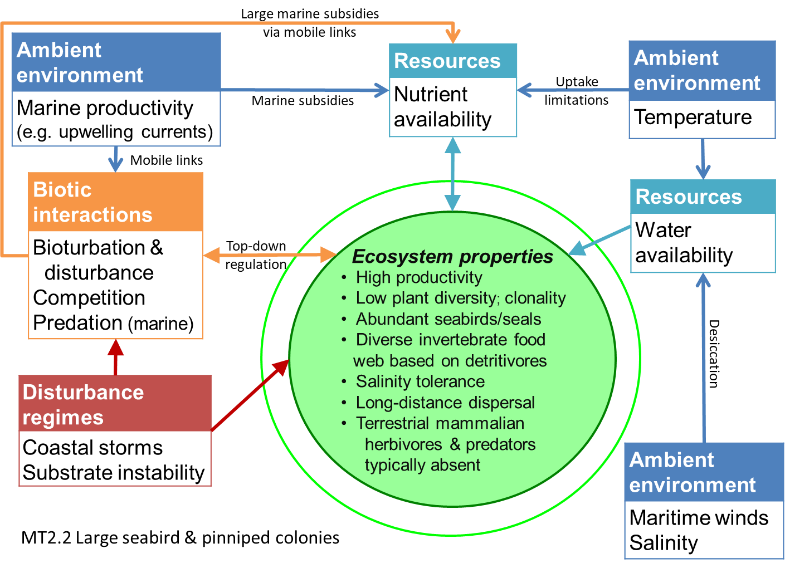Global ecosystem typology
Alternative site for the Global ecosystem typology with additional information for ecosystem profiles and indicative maps.
This site is maintained by jrfep
MT2.2 Large seabird and pinniped colonies
Biome: MT2. Supralittoral coastal biome
Contributors:
(texts)
– profile in preparation –
Key Features
Localised areas of bare or vegetated ground with diverse microbial communities at the ocean interface receiving massive nutrient subsidies and disturbance from large concentrations of roosting or nesting seabirds and pinnipeds that function as mobile links between land and sea.
Overview of distribution
Scattered globally on islands and coastlines, but most common in polar and subpolar regions.
Profile versions
- v2.1 (2022-04-06): S Gorta; SF Bokhorst; JC. Ellis; DA Keith Full profile available at official site
Main references
Selected references for this functional group:
Ellis JC (2005) Marine Birds on land: A review of plant biomass, species richness, and community composition in seabird colonies Plant Ecology 181, 227–241
S. N. Riddick, U. Dragosits, T. D. Blackall, F. Daunt, S. Wanless and M. A. Sutton (2012) The global distribution of ammonia emissions from seabird colonies Atmospheric Environment 55 (2012), pp. 319-327 DOI:10.1016/j.atmosenv.2012.02.052
Otero XL, De La Peña-Lastra S, Pérez-Alberti A, Ferreira TO, Huerta-Diaz MA (2018) Seabird colonies as important global drivers in the nitrogen and phosphorus cycles Nature Communications 9, 246
Diagrammatic assembly model

Maps
Maps are indicative of global distribution patterns are not intended to represent fine-scale patterns. The maps show areas of the world containing major (coloured red) or minor occurrences (coloured yellow) of each ecosystem functional group. See general notes on maps.
Information about the current valid indicative map for this functional group is shown below.
MT2.2.IM.orig_v1.0
Datasets
- Seabird-colonies-NP
Map references
Otero XL, De La Peña-Lastra S, Pérez-Alberti A, Ferreira TO, Huerta-Diaz MA (2018) Seabird colonies as important global drivers in the nitrogen and phosphorus cycles Nature Communications 9, 246
Check: the Glossary / Profile structure / the public document